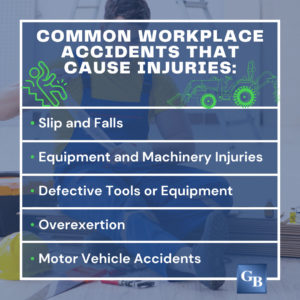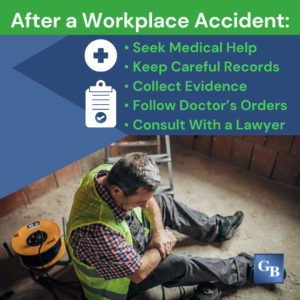What Are Common Causes of Workplace Accidents?
The most common workplace accidents are listed below, according to the U.S. Bureau of Labor Statistics (BLS).
Slip and Fall Accidents
Among the top causes of workplace injury is employees who slip and fall. These accidents have any number of causes, such as:
- Slick floors.
- Cords.
- Equipment not clearly marked or secured.
- Defective ladders, lift equipment, scaffolding, or platforms.
- Inappropriate safety equipment on roofs.
- Torn carpeting.
Falls can be on the same level or between two or more levels. They also include workers who fall through an opening, such as construction workers.
Slip and falls are common among service workers and restaurant, retail, and hospitality workers who are on their feet over various surfaces in their daily jobs. There may be slippery, worn or torn surfaces, or they may trip over an object in their way.
Overexertion
Workers can easily hurt themselves when lifting or lowering heavy materials or repeatedly performing a task that requires the use of the same muscles. Working too many hours in a row can also cause overexertion.
Overexertion causes many challenges. For example, workers with sore muscles and little energy may not adequately or safely perform their duties. Also, an overly fatigued worker may make mistakes that injure themselves and others.
Equipment Injuries
Many workplaces have moving equipment. This equipment can be dangerous if operated by an inexperienced person or is used near untrained staff. The employer may also lack safeguards, such as signage, floor markings, horns, and other warning signals to alert employees of moving equipment. Defective equipment can also lead to workplace accidents if an operator cannot steer or brake to avoid a collision.
Defective Tools and Machinery
Workplaces often have hundreds of different power tools, equipment, and machinery used daily or frequently. Any of these can be defective and not operate safely while being used for their intended purpose. The result can be severe accidents.
Sometimes, an employer is negligent in inspecting and maintaining workplace tools and equipment. Broken or worn equipment can cause serious injury to an unsuspecting worker.
Hazardous Contact
Contact with a piece of machinery or materials can lead to a worker being crushed or caught between two items. The cause is often a lack of trained workers or inadequate safety warnings and protocols by the employer.
Motor Vehicle Accidents
Workers who drive for a living, including commercial truck and bus drivers, run the risk of operating a defective vehicle. If a braking or steering system gives out, many lives could be at risk. A driver can also be subject to driving on roads that have not been appropriately maintained. If they are in an accident with injuries, they can file a legal claim against the government entity responsible for safe roadways.
Finally, some employers of commercial truckers may require them to work against unrealistic deadlines or on shifts that are longer than federal guidelines mandate.
Falling Objects
Construction, manufacturing, and warehousing are typical workplaces where materials are often lifted and lowered. Inadequate safety protocols, defective equipment, and lack of training can lead to severe injuries when a heavy falling object hits a worker.
Electrical Shock
Electrocution can happen in any workplace that depends on electric power to operate machines, tools, and other devices. Improper grounding, frayed cords, and many other flaws can cause direct shock or an arc shock injury. Electrical equipment and power sources need to be inspected and maintained regularly.
Exposure to Toxins
A worker does not have to have a visible injury to be hurt. Many times, exposure to harmful chemicals, carcinogens, and other toxins can cause a person to fall ill with cancer, lung disease, neurological problems, systemic poisoning, and other ailments. These medical problems may take years to develop, but if they do, a person should always consider whether their work activities are to blame.
 Google Screened
Google Screened


